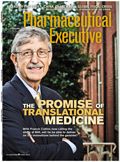To Align an Audience, Find a Pulse
All this uncertainty at the back end of drug development is a drain on future therapeutic progress against disease. It's a job killer, too.
FEEDBACK IS A STIMULUS to the connections that ensure progress in the human condition. Like an injection of adrenaline, it can be an unstable shock to the system—but it keeps the brain alert and the heart engaged. Just as new medicines depend on outside KOLs to find that sweet spot of clinical differentiation, so too do we in the writer's trade require an occasional dial-in from readers to certify our place among the competition. Feedback ensures that the desktop is not our only dance partner. It's a gift that yields a dividend of good sense, especially to those of us distracted and disconnected by the "of-the-moment" mindset so prevalent in publishing today.

William Looney
Pharm Exec's best source of feedback is our Editorial Advisory Board, with 35 members drawn from each of the constituencies that comprise our "C suite" subscriber base. I can say the EAB is one of the broadest, most diverse, and experienced in the B-to-B publishing space. Our most recent meeting on Jan. 18 at Pharm Exec's editorial offices in New York attracted 27 of these "best and brightest." The dialogue is worth summarizing due to the insights on challenges facing the industry, the range of perspectives expressed, and the implications it has for Pharm Exec's editorial mission going forward.
One conclusion of the group is the lack of attention to the development of human capital. As noted in various survey reports, training in broad, high-impact skills such as understanding the competition is not a priority for most companies. Cost reduction efforts are curtailing the options for professional growth while putting more pressure on younger managers to execute strategies they often had little part in devising. Tighter performance metrics are in vogue at a time when the business model is buffeted by an uncertain external environment. The meaning behind the message is entwined in a paradox: Managers today are accountable for the unpredictable.
Board members recommended that Pharm Exec leverage its high-exposure editorial platforms such as the "Emerging Pharma Leaders" (in the upcoming June 2011 issue) with coverage that helps managers expand their skill set and apply them in that gray zone where "business meets policy."
Another focus was the politicization of the regulatory space, led by the intrusion of cost factors into licensing decisions and revival of the "medical needs" criteria, where priority or fast-track approval for innovations can be withdrawn and thus no longer guarantees permanent access to the market. The trend has negative implications for oncology and rare disease drugs, with many EAB members emphasizing Pharm Exec step up its editorial mission to explain how medicines innovation really works—all this uncertainty at the back end of drug development is a drain on future therapeutic progress against disease. It's a job killer, too.
This month's cover feature on NIH Director Francis Collins and his initiative on translational medicine illustrates the diversity of approaches to innovation. The big question is whether NIH knows precisely what to "translate," defining where the industry and government roles can profitably intersect, and when, how, and if a distracted Congress will spend the money to make it happen.
This, in turn, led to the inevitable debate on the importance of good information to help the industry disarm its critics and enhance its value proposition to society. Board members underscored the reputational challenge to the industry posed by fallout over what is perceived as bank-breaking health reform legislation in the US. New data analytics capabilities will show the industry in a much better light, as a cost-saver rather than a cost-driver. The issue is bonding these data capabilities with simple messaging that resonates with legislators and the public.
All in all, a good discussion—and Pharm Exec now has the perfect new vehicle to take the debate beyond the conference room. I am pleased to announce the launch this month of the Pharm Exec Global Digest, a compilation of content from this and our other life sciences publications as well as many new offerings—all presented in an accessible, digital magazine format to an expanded circulation of 70,000 readers, on four continents. The exposure is truly global in scope, which is precisely where we should be in light of where the industry is heading and in the priorities identified by our Board. We look forward to your reaction.
William Looney
Editor-in-Chief

Addressing Disparities in Psoriasis Trials: Takeda's Strategies for Inclusivity in Clinical Research
April 14th 2025LaShell Robinson, Head of Global Feasibility and Trial Equity at Takeda, speaks about the company's strategies to engage patients in underrepresented populations in its phase III psoriasis trials.
Bristol Myers Squibb’s Cobenfy Falls Short in Phase III Trial as Add On Therapy for Schizophrenia
April 23rd 2025In the Phase III ARISE trial, Cobenfy administered as an adjunctive treatment to atypical antipsychotics for patients with inadequately controlled schizophrenia did not achieve statistically significant improvements.
Key Findings of the NIAGARA and HIMALAYA Trials
November 8th 2024In this episode of the Pharmaceutical Executive podcast, Shubh Goel, head of immuno-oncology, gastrointestinal tumors, US oncology business unit, AstraZeneca, discusses the findings of the NIAGARA trial in bladder cancer and the significance of the five-year overall survival data from the HIMALAYA trial, particularly the long-term efficacy of the STRIDE regimen for unresectable liver cancer.
Expanding Immune Response Testing to Support Vaccine Development
April 22nd 2025Nigel McCracken, chief operating officer, Virax Biolabs, discusses the expansion of its ViraxImmune platform into areas such as transplant monitoring, vaccine efficacy, latent virus reactivation, and CAR T cell therapy.